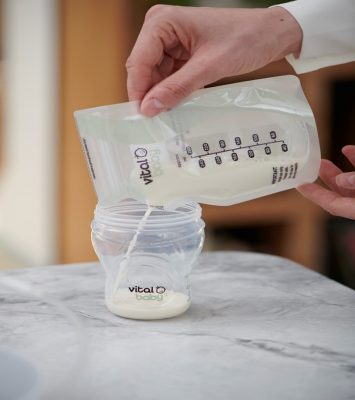The foundation of good parenting is in establishing the two most important aspects of your newborn’s growth and care; that of correct feeding, and establishing their sleep routine, which will stand them in good stead for the rest of their lives.
Sleep is important to infants as this is when they process new experiences and abilities they have learned, preparing them to wake up refreshed, so they can learn more.
If a baby doesn’t get adequate sleep at night, it can lead to a decrease in brain development, learning problems, emotional difficulties, weight loss and possible illness.
Chronic sleepiness, however, can be just as concerning. If your newborn is sleeping for more than 17 hours a day and it’s interfering with their ability to eat at least eight times per week, you should let your paediatrician or medical consultant know. Frequently missing meals can affect their weight gain milestones and developmental growth.
Bear in mind, however, babies are unique human beings and, therefore may vary in the amount of sleep they need. Use general guidelines to assess where your child’s specific disposition falls. Trust your gut and call on professional help when you feel something is off and you need a second opinion.
As parents, learn the basics of your newborn’s sleep requirements and together, enjoy stress-free days and nighttime settling to sleep with gentle kisses.
Newborn sleep cycles
In general, infants require eight to nine hours of sleep during the daytime and eight hours of sleep at night.
New-born babies have both active and quiet sleep. However, since they still have tiny tummies, they are known to sleep in short bursts of 20 to 50 minutes and wake every few hours to feed during the day and night, taking in around eight to 12 feeds over a 24-hour period.
Start to read your baby’s cues when it is time to settle them to sleep, such as rubbing their eyes and yawning, so you can establish a smooth routine for the whole family to learn and set in place.
As baby becomes drowsy, their eyes droop and may open and close, and they may appear to be dozing. As they move into light sleep, they can be startled by sounds, causing them to display the Moro reflex of sleeping with their arms above their head. It is also known as the ‘startle reflex’ and is a sleep-wake reaction to sudden sounds that usually disappears by six months of age. When your baby falls into a deep sleep, they are quiet and do not move.
Four-month fatigue
Baby’s new routine can be tough on first-time parents, however, by four months, most babies begin to sleep longer throughout the night.
Be aware that as a parent your own mental health can be affected by lack of sleep too and you may want to ask for support from friends and family when you need to catch up on your much-needed rest.
One of the most useful tools you will ever need is a Vital Baby manual or electric breast pump so you can pump your breast milk and store it in the freezer in hygienic pouches so a caregiver or your partner can fill in the baby’s feeds when you need a break.

Another invaluable infant accessory is the Soothe Airflow Newborn 0+ pacifier to soothe and comfort your baby, while at the same time helping to strengthen their reflex sucking muscles in the mouth and throat.
Vital Baby’s symmetrical soother teats make the soother easy for your baby to hold in their mouth; while moms and dads can benefit from the 0-6 months Glow-in-the-dark soother which makes it easy to find in the dark without disturbing baby.
Between the age of 3 and 6 months, some babies have 2 to 3 long-ish sleeps during the day, while others just have short naps. A few infants sleep 12 hours at night without interruption, some manage 8 hours while many others may wake regularly for feeds.
Six-month A-okay lullaby
From about 6 months old, your baby’s sleep patterns will begin to align more with yours, as they learn to sleep the longest period at night, on average for about 13 hours in a 24-hour cycle, with daytime naps which drop off to around two during the day.
Sleep training tips
You can help your baby to sleep longer with the following tips:
Feed them correctly during the day. Sometimes this may be difficult for new mums suffering from sore, chaffed, and dry, cracked nipples. The relief you will get from the Vital Baby Nipple Shields in the easy snap case will be complete, making feeding a breeze again.
After feeding, keep your baby upright for 10 to 15 minutes or longer if your baby spits up or has Gastroesophageal reflux disease (GERD). As their digestive systems settle in newborns may spit up occasionally, which is nothing to worry about.
Swaddle babies correctly at night, and tuck the covers securely under their arms so they cannot slip over their heads. Babies’ heads should never be covered, and it is important to keep their crib free of soft toys and cushions that could smother them. For added warmth, layer lightweight blankets.
Baby’s mattress should be firm, flat, well-fitting inside the crib, clean, and waterproof on the outside. Simply cover the mattress with a single sheet.
Always lay your baby on their back to sleep to reduce the risk of sudden infant death syndrome (SIDS).
Establish a nighttime routine. Babies sleep best in a darkened room as light stimulates their brains.
Once you are able to read your baby’s cues and you see they are tired, put them down in their crib while drowsy but still awake. Sit in a chair next to them. Once the baby is asleep, leave the room. If they cry, delay your response time, and keep all night-time interactions brief. Return and sit back in the chair next to their crib. Every few nights, you can move the chair slightly further back until you are eventually out of the room. Babies are sensitive to your emotions, so it is important to feel confident in what you are teaching.
You can also introduce white noise in the room to calm and settle them.
Preventing problematic sleep:
If your new-born sleeps heavily during the day and is up during the night; or they are showing other common sleep problems such as frequent waking up, restless sleep or waking early, understand that these are all learned behaviours which they can grow out of if you stick to a bedtime routine. Never allow your newborn to become over tired as this makes it harder to settle them.
Be confident enough to adjust baby’s bedtime to fit in with the family’s evening routine or to suit your baby’s own natural sleep, feed, and play routines. If you usually put your baby down at 7 p.m., but they cry for approximately 30 minutes in their crib, their natural bedtime (i.e. their 24-hour sleep wake cycle known as their circadian rhythm) is likely closer to 7:30 p.m. You can start by shifting back bedtime by 15 minutes each night until you’ve reached the desired time.
Remember, as with all things, managing your new-born will be a process of trial and error as you learn and adjust your lifestyle to your baby’s needs. If you are feeling challenged, remember that no one method works for everyone and there is no right or wrong way to do things.
Find a routine that works for you and stick to it, allowing your baby at least a week of consistent routine to learn the new skills. Since infants have no concept of time, their bedtime routine is as important as their precious sleep, as it prepares them to recognise what it next going to happen.
As their small bodies start to learn their sleep routine is associated with relaxing and resting for the night, they will also learn the ability to self-soothe just before the onset of sleep.
Something else…
Since you baby is unable to tell you what it needs, it can be hard to know if they are feeling sick. If they are fretful, listless, cranky, lethargic, hot, pale, or flushed, it is a good idea to take them to the doctor. The most common symptoms of childhood illness are fever, vomiting, diarrhoea, pain, rash, cough, and headache.
Quick, accurate and super simple to use, the Vital Baby multi-use 4 in 1 infra-red contactless thermometer detects the temperature in just 2 seconds and gives the result on its large fever alert colour changing, digital display. With an ear and forehead mode it is a discreet way to take your baby’s temperature without disturbance and its liquid mode takes the guess work out of your baby’s bath or milk temperature.
During the initial stages, your baby will breathe solely through their nose, a blocked nose can interrupt sleep and feeding time, as well as cause discomfort for your baby. Perfectly sized for little noses, the Vital Baby Nasal Protector is designed to clear congestion and ease discomfort for when they are unable to clear it themselves.

Final sleepy-time words
Singing, reading, and talking to your baby are essential for showing love and care and soothing them into safety and sleep.
A recent study on sleep in infants found that lullabies significantly reduced a child’s problematic sleep behaviours within just two weeks. It is important that you cue your child with the same lullaby each night.
Learn something simple to remember or sing a family lullaby carried down the generations. You can also find inspiration on YouTube where African lullabies and nursey rhymes and soothing sleep sounds can settle and soothe them for when you can’t be there to sing yourself.
Always wake your baby up with a bright voice and a big smile and set the scene for the day ahead.
You will find that as you give your baby child lots of praise and loving attention you will see them develop, thrive and bloom.


